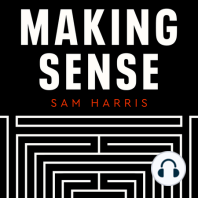46 min listen
#178 — The Reality Illusion
ratings:
Length:
67 minutes
Released:
Dec 11, 2019
Format:
Podcast episode
Description
In this episode of the Making Sense podcast Sam and Annaka Harris speak with Donald Hoffman about his book “The Case Against Reality.” They discuss how evolution has failed to select for true perceptions of the world, his “interface theory” of perception, the primacy of math and logic, how space and time cannot be fundamental, the threat of epistemological skepticism, causality as a useful fiction, the hard problem of consciousness, agency, free will, panpsychism, a mathematics of conscious agents, philosophical idealism, death, psychedelics, the relationship between consciousness and mathematics, and many other topics. SUBSCRIBE to continue listening and gain access to all content on samharris.org/subscribe.
Released:
Dec 11, 2019
Format:
Podcast episode
Titles in the series (100)
#24 — Ask Me Anything 2: In this episode of the Waking Up podcast, Sam Harris answers questions from listeners about Islamism, free will, honesty, vegetarianism, why he doesn’t publish more in academic journals, and other topics. by Making Sense with Sam Harris
